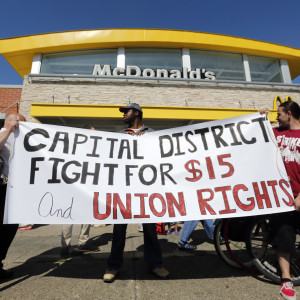Millions of hourly workers could lose their jobs if Democrats raise the minimum wage to $15 an hour.
Many House and Senate Democrats are still pushing the Raise the Wage Act, which would more than double the current minimum wage by 2025. Though they advocated a $15 federal minimum wage for years, the legislation is gaining fresh momentum under a Biden administration amid new COVID relief bill negotiations. A minimum wage hike, Rep. Bobby Scott (D-VA) suggests, is a moral obligation.
If only that were true. Raising the minimum wage could put millions of Americans out of work—many of whom could be essential workers.
A government-forced wage increase would be cruel timing for many businesses that are still trying to recover from a recession that left more than 10 million Americans still unemployed. This comes on the heels of unemployment bonuses that incentivize work refusals and which have led to more than 140,000 small businesses closing their doors in 2020. Additional mandates like a minimum wage hike this year have the potential of closing even more, adding insult to injury.
Businesses in the hospitality, travel, and entertainment industries often rely on hourly workers they’ve had to place on furlough or lay off due to COVID lockdowns. As these businesses try to salvage their American Dream, the added expense of a $15 minimum wage hike could derail their efforts and stall economic recovery, if one comes at all. Yet Democrats are choosing to downplay this economic reality.
Even economist and Secretary of the Treasury Janet Yellen is ignoring the most fundamental economic principle of supply and demand—if job prices rise, demand for labor will shrink—saying instead the negative effects will be “very minimal.” The Wall Street Journal called her statement an “on-the-fly editing of the economic literature” that contradicted previous statements she had made about the effects of raising the minimum wage.
Democrats, and the bureaucrats who like to play them, are using economic gymnastics to justify their short-sighted policy agenda. They’re not doing anyone any favors, especially not the most vulnerable hourly workers.
Mandated minimum wage hikes have a history of hurting less experienced and entry-level workers the most. This was true for Seattle after the city raised the minimum wage in 2014. Researchers found the law made the most vulnerable employees poorer while higher-skilled workers with more education benefited. It’s worth noting a city experiencing an explosion of economic growth like Seattle was at the time is better able to absorb a wage hike than more stagnant areas of the United States that have been harder hit by the recession. Rural America will not fare so well.
The evidence is overwhelmingly clear that a federal minimum wage hike would certainly cost jobs for groups like teens and part-time workers the most. It would exacerbate income inequality across the country, especially in the most vulnerable regions. Yet Democrats are suggesting the opposite is true.
And now, the non-partisan Congressional Budget Office (CBO) estimates the minimum wage hike would cut 1.4 million jobs, increase the deficit by tens of billions of dollars, hike prices for everyday goods, and strain small businesses. Sen. Bernie Sanders (D-Vt.) must regret asking for a fiscal analysis of the bill.
While a forced raise would harm all businesses, small businesses and budding entrepreneurs will bear the brunt of it. Local restaurants still recovering from mandatory shutdowns and operating on thin margins won’t be able to absorb the added cost in the same way billion-dollar corporations like Amazon and Walmart have been able to. A minimum wage hike may help hourly employees who work for the corporate giants big enough to carry the expense, but your neighborhood grocery store or bakery will likely pass down prices to consumers, cut employee hours, or choose to lay off workers.
It may be easy for those who do not believe they will be affected by a minimum wage raise to look the other way or claim virtue by advocating for the change. The costs of their virtue signaling will ripple across the nation. The entire country’s output will contract and the cost of living will rise, according to the CBO. The result will be deficits, inflation, and lending rate increases for everyone. Not to mention, the real possibility of a total loss of less vibrant local economies after small businesses that are hanging on by a thread close-up shop for good.
Democrats are plugging their ears when confronted with these economic realities of a minimum wage hike, meanwhile playing off their moral obligation propaganda that it will help essential workers. The truth is it will only help the most experienced essential workers lucky enough to work for a company big enough to afford it.
If Democrats really cared about lower-wage workers as they claim, they’d be fighting for all of them, not just a fraction. To “restore balance” in the economy, Democrats would be wise to turn their attention to letting all businesses return to business as usual rather than kicking them while they’re already down.

